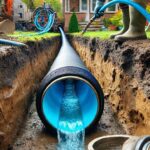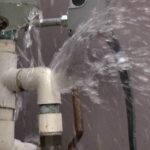Plumbing systems are the lifelines of our homes, providing us with water for various needs and ensuring efficient wastewater disposal. However, these intricate networks of pipes, fixtures, and drains can sometimes fall victim to hidden issues that, if left unchecked, can lead to costly emergencies. This is where regular plumbing inspections play a crucial role in identifying potential problems early and preventing disastrous consequences. In this blog, we’ll dive into the importance of plumbing inspections, their benefits, and how they contribute to maintaining a functional and efficient plumbing system.
Understanding Plumbing Inspections
Plumbing inspections involve a systematic assessment of a home’s plumbing system, encompassing pipes, fixtures, drains, water heaters, sewage systems, and more. These inspections are conducted by experienced plumbers who are trained to identify existing or potential issues that could escalate into emergencies if not addressed promptly.
The Benefits of Plumbing Inspections
- Early Problem Detection: Plumbing inspections serve as a proactive measure to detect issues in their early stages. Identifying problems before they escalate can prevent major disruptions and costly repairs.
- Cost Savings: Regular plumbing inspections can save homeowners substantial amounts of money in the long run. Addressing minor issues early on prevents them from developing into more significant problems that require extensive repairs.
- Preventing Emergencies: By addressing potential problems before they become emergencies, plumbing inspections help homeowners avoid unexpected disruptions to their daily lives and ensure the comfort and safety of their families.
- Optimal Performance: Regular inspections and maintenance contribute to the optimal performance of plumbing systems. Well-maintained systems are more efficient, which translates to reduced water bills and a longer lifespan for plumbing components.
The Plumbing Inspection Process
A comprehensive plumbing inspection involves several key components:
- Visual Inspection: Plumbers visually assess pipes, fixtures, and drains for signs of leaks, corrosion, rust, and damage.
- Water Pressure Check: Testing water pressure helps identify issues such as clogs, blockages, or improper valve settings that can affect the performance of fixtures.
- Drain Inspection: Plumbers inspect drains for slow drainage, clogs, or buildup that could lead to backups and overflows.
- Water Heater Inspection: Water heaters are assessed for signs of leaks, sediment buildup, and efficiency issues that can impact hot water supply.
- Sewage System Examination: For homes with septic systems, plumbers inspect the system’s components for signs of damage or blockages that could lead to sewage backups.
Story 1: The Timely Inspection
Imagine a Dallas homeowner named Mark who decided to schedule a plumbing inspection for his older home. During the inspection, the plumber discovered a small leak in a hidden pipe within the walls. The plumber promptly repaired the leak, preventing it from causing further damage. Mark was relieved that the issue was caught in time, saving him from costly repairs and potential water damage.
Preventative Maintenance Plans
Many plumbing companies offer preventative maintenance plans that include regular plumbing inspections. These plans provide homeowners with peace of mind, knowing that their plumbing systems are being regularly monitored and maintained by professionals. Preventative maintenance plans often include priority service, discounts on repairs, and early problem detection. At Metro-Flow Plumbing we offer our customers the opportunity to sign up to our Diamond Club membership. At roughly $10 a month, we stay on top of your plumbing maintenance needs, offer discounts on plumbing jobs, and even have you skip the line when times get tough. To learn more about our Diamond Club membership, click here.
Story 2: The Importance of Routine Inspections
Jennifer, a homeowner in Dallas, subscribed to a preventative maintenance plan that included annual plumbing inspections. During one inspection, the plumber identified a small leak in her water heater. The plumber was able to repair the leak and conduct preventive maintenance, extending the water heater’s lifespan and ensuring Jennifer’s family wouldn’t face a sudden loss of hot water during the winter.
Plumbing inspections are not merely routine tasks; they are essential proactive measures that can save homeowners from costly emergencies and disruptions. By detecting issues early, addressing minor problems, and maintaining the optimal performance of plumbing systems, inspections provide peace of mind and ensure the longevity of a home’s plumbing infrastructure. Homeowners in Dallas and beyond are encouraged to consider regular plumbing inspections as a valuable investment in their property’s safety, functionality, and financial well-being. Don’t wait for an emergency to arise—schedule a plumbing inspection today by calling us at 214-328-7371 and enjoy the benefits of a well-maintained plumbing system that stands ready to serve your family for years to come.

About Metro-Flow Plumbing in Dallas, TX
Metro-Flow Plumbing was founded in 1989 under three core principles: to provide the best plumbing service, outstanding customer service, and to always be honest with its customers. These principles have kept Metro-Flow Plumbing in business for over 30-years. Rick Romero, Founder and Master Plumber at Metro-Flow Plumbing, as well as the trained technicians at Metro-Flow Plumbing, take great pride in the work they provide to their customers in Dallas and surrounding cities. Metro-Flow Plumbing offers a 100% service guarantee to all their customers.









